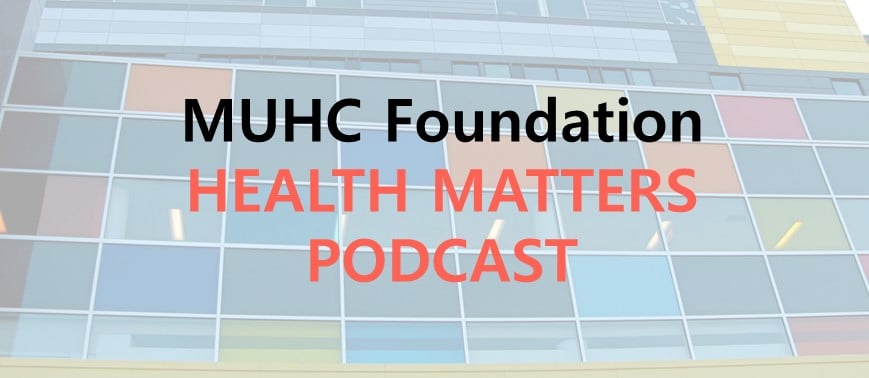Interesting Facts about your Microbiome
Irah king, PhD, shared some interesting facts about our microbiome with Tarah Schwartz in an MUHC Foundation’s Health Matters interview.
(Time on podcast: 1:02). The microbiome is all the microorganisms (virus, fungi, parasites, bacteria) that live on or in us. This microbiome is actually critical for our health, but can also contribute to disease or impact how we respond to treatments. Each one of us have a unique microbiome living on our skin, in our intestine, or in our lungs. Our microbiome has an important role and it actually educates our immune system as we grow and develop. This then sets how our bodies respond to infections, wounds and disease later in life.
Many research projects are now focusing on how these early life events can impact our microbiomes and shape our later health. There is also a focus on how we can change or modify the microbiome to help prevent diseases as we age such as rheumatoid arthritis, cardiovascular disease, inflammatory bowel disease. The one thing we as humans can do to promote a healthy microbiome is to change or improve our diets. We can modify our microbiome by changing what we eat. This can help to prevent disease in the future. Interestingly, a diet higher in fiber and vegetables will increase the bacteria that have anti-inflammatory effects on the body. We must be aware, however, that dietary changes must be personalized as our microbiomes vary between each of us.
One exciting project currently underway is studying how our microbiome can help either prevent or stop the progression of Alzheimer’s disease. Some microbes can metabolize cholesterol, which is associated with the development of cardiovascular disease and Alzheimer’s disease. Maybe there is a way to harness the power of these microbes to metabolize cholesterol in our bodies to reduce the risk of developing these diseases. This is an exciting time in microbiome research.
How Quebec is working to reduce TB numbers in Quebec
Also on the podcast, Hear from Dr. Kevin Schwartzman about The World Health Organization’s hope to eliminate TB by 2030 and how experts are working to reduce its numbers in Quebec.
(Time on podcast: 22:03). In 2020, TB was the second leading infections killer after COVID-19. TB is an infection diseases caused by a bacterium and it can spread through the air like COVID. It enters the body mostly through the lungs. TB actually only exists in human hosts. It does not actually live and survive in the environment. TB is very transmissible and it is very easy for the bacteria to spread via coughing. Because TB only lives in human hosts, it has evolved and become very good at infecting and living inside humans. Many think of TB as on old illness, TB is actually very much prevalent and still with us, particularly in Northern Quebec communities. Rates of TB are lower in parts of the world where living conditions have greatly improved and where there is better housing and nutrition.
Archeological evidence suggests that TB has been living with us for millennia. The TB lifecycle is quite different from other infectious diseases – it can actually remain dormant in humans for decades. This is why it makes it so difficult to eradicate. The good news is that TB is curable and preventable. However, it does require intense treatment regimens that include six months of antibiotics. People who have dormant TB can also be successfully treated with shorter antibiotic regimens. The challenge for us, is that about 1/4 of the world’s population is believed to have dormant TB infection. This means there is a huge reservoir or people who might one day become ill with TB.
Inuit communities often face very high TB burdens. For Quebec, the rate of TB can be as much as 40 times higher in Indigenous Canadians compared to other people living in Canada. Communities are working with public health and health providers to mitigate this. Measures include proactive contact investigation to access transmission to close contacts. Long term investments to eliminate TB will include improved housing and living conditions.
Listen to the Podcast
An anonymous donor leaving an indelible impact. The MUHC Foundation’s Health Matters. April 3, 2022.
Web: http://bit.ly/3aQfvVQ
Spotify: https://spoti.fi/32HFxrc
Apple: https://apple.co/35NvItS
